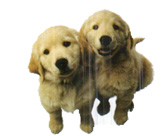>
New Products >> VET - 9 Urine Reagent Test Strips

MATERIALS PROVIDED:
1.One bottle containing 25 strips
of Vet - 9 Test Strips.
2. A color chart for reading test
results is printed on the bottle label.
EASY TO USE:
1. Remove from the bottle only enough
strips for immediate use and replace cap tightly.
2. Dip reagent strip into fresh,
well-mixed urine. Remove the strip immediately.
3. While removing, touch the side
of the strip against the rim of the urine container
to remove excess urine.
4. Compare
each reagent area to its corresponding color blocks on the color
chart and read
at the times specified. Proper read time is critical for
optimal results.
ARE YOU CONCERNED ABOUT YOUR ANIMALS HEALTH?
As with humans, the urine tests can
be performed to give clues as to what might be affecting the health
of your animal. Erdos-Teco's new reagent strips for animals are
a useful indicator of renal function, and should  be
performed on any animal suspected to have renal disease or urinary
tract pathology. be
performed on any animal suspected to have renal disease or urinary
tract pathology.
HOW DOES VET
- 9 WORK?
Urine Reagent Strips for Animals
(VET - 9) are firm plastic strips to which several different reagent
areas are affixed. Teco Urine Reagent Strips provide tests for Glucose,
Ketone (Acetoacetic acid), Specific Gravity, Blood, pH and Protein
in Urine.
WHAT CERTAIN PROPERTIES ARE THERE TO LOOK
FOR IN ANIMAL URINE?
There are several physical properties
that can found in animal urine.
, Volume

,
Color
,
Turbidity
,
Odor
WHAT PARAMETERS DOES VET-9 TEST FOR?
Glucose: In the normal animal there should not be glucose
in the urine. If glucose is present, an investigation into hyperglycemia
should be done for the possibility of glucosuria
in the patient.
Bilirubin: Normal dogs can have detectable bilirubin in
their urine, but large amounts should not be present.
Ketone: In the normal animal there will be no ketones in
the urine. An animal that is undergoing fat metabolism or is deficient
in carbohydrates will have ketones in the urine.
Specific Gravity: Specific gravity measures the concentrating
ability of the kidney tubules. It is the ratio of the weight of
urine to the weight of an qual volume of water. Normal values range
from 1.001-1.060 in most domestic animals.
Blood: There should not be any blood in the urine of abnormal
animal.
pH: Urine pH will be affected by many things including
the diet, handling of the sample, and acid-base balance of the animal.
Normal pH is between 6 and 8 for most animals depending on their
diet.
protein: Concentrated dog and cat urine can contain small
amounts of proteins. In significantly dilute urine, false negatives
are possible.
Urobilinogen: The test area will react with interfering
substances known to react with Ehrlich's reagent.
Nitrite: Normally no detectable amount of nitrite is present
in urine. The nitrite area will be positive in a proportion of cases
of significant infection, depending on how long the urine specimens
were retained in the bladder prior to collection.
|
|
|
|

